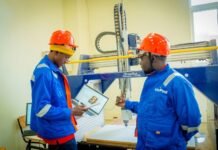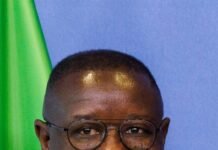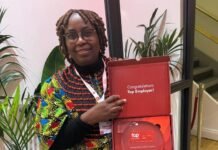By PEL Koroma, Embassy of Sierra Leone, Washington, D.C.
As a distinguished speaker and honored guest of the 2024 Norman Borlaug International Dialogue hosted by the World Food Prize Foundation in Iowa, USA, Sierra Leone’s Minister of Agriculture, Dr. Henry Musa Kpaka, delivered a compelling address on the nation’s proactive efforts to foster partnerships that advance food security amidst global challenges. During a panel discussion at the Iowa Events Center, Dr. Henry Musa Kpaka underscored Sierra Leone’s ongoing commitment to transforming its food systems and alleviating food insecurity influenced by climate change and conflict.
Highlighting Sierra Leone’s pride in the accomplishments of Professor Monty Jones, a World Food Prize laureate, Dr. Henry Musa Kpaka emphasized the importance of homegrown solutions in agriculture, stating that Sierra Leone’s approach aims to inspire and engage young Africans. “Our youths, who remain largely unemployed, can be instrumental in advancing agricultural transformation,” he said, noting that enhanced agricultural engagement could unleash economic growth across Africa.
Dr. Henry Musa Kpaka stressed the need for Sierra Leone to leverage the African Continental Free Trade Area and create regional alliances, especially within ECOWAS, to bolster food security. “Through these collaborations, we have identified ten critical areas to advance food security programs,” he noted.
Discussing Sierra Leone’s rice importation challenge, which costs the nation over $200 million annually, Dr. Henry Musa Kpaka pointed to President Julius Maada Bio’s Feed Salone project as a central initiative for increasing rice production and reducing dependency on imports. “Agriculture is the engine of our national growth strategy, a key job creator for youth and a vital area for partnership,” he explained. He also outlined the Government’s focus on learning best practices in soil management, fertilizer use and nutrient optimization, all in collaboration with stakeholders, including farmers and the private sector.
Dr. Henry Musa Kpaka shared that Sierra Leone’s strategy includes encouraging rice importers to contribute to the country’s domestic rice value chain. He presented a roadmap for increased local rice production, developed in consultation with President Bio, yet acknowledged the current gap between local yields and national demand, which complicates setting firm requirements for importers.
At a press conference following the event, Dr. Henry Musa Kpaka addressed the challenges posed by certain stakeholders resistant to the country’s drive toward food sufficiency. He also emphasized the need for policies that would grant low-interest loans to farmers, supporting increased productivity. “We must move beyond exporting raw materials and instead focus on value-added processes that foster economic growth and reduce dependency on foreign markets,” he stated.
In closing, Dr. Henry Musa Kpaka advocated for enhanced value addition along the food production chain, inviting U.S. and international buyers to invest in Sierra Leone’s agricultural sector. He stressed the role of technology, irrigation and private-sector investment in achieving long-term food security, adding, “Credible partnerships are essential to build sustainable and productive relationships.”
Joining the Minister of Agriculture on October 29, 2024 on the panel were Honduras’s Minister of Agriculture, Laura Elena Suazo Torres and Ambassador Kanzo of Tanzania, who both contributed insights on fostering resilience in food systems across developing nations.




